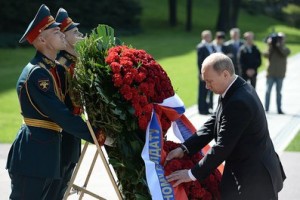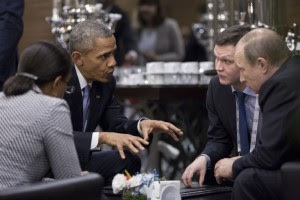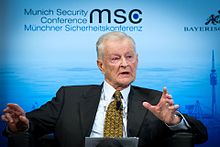
Aleppo, Syria (Michael Aalaeddin, Sputnik)
The Russian and Syrian air forces have not run any bombing missions over Aleppo for about a week and a half in an attempt to give the humanitarian corridors as much chance as possible to be utilized by both civilians and rebels who are willing to leave the area. Simultaneously, Lavrov and Kerry had more discussions, with Lavrov reiterating the need for Washington to separate the unicorn “moderate rebels” from the terrorists – a project that will likely continue to fail since there aren’t any “moderate rebels” to speak of operating in East Aleppo. RT reported last week:
According to the Defense Ministry spokesman, 48 women and children left the rebel-held area on Monday. “Late Monday, October 24, 48 women and children accompanied by officers of the Russian reconciliation center and Syrian authorities left eastern Aleppo through [the] humanitarian corridor. They have been provided with the necessary medical aid, hot meals, and night accommodation,” Konashenkov added.
The spokesman added that civilians can use six humanitarian corridors to leave the city. They will then be treated at reception centers and offered first aid and hot food.
Last week, Damascus and Moscow stopped carrying out airstrikes in eastern Aleppo and opened a number of humanitarian corridors for those wishing to escape the areas of the city controlled by terrorists and rebels, in the hope that the temporary truce would lead to a complete ceasefire.
Despite the humanitarian pause having been prolonged several times, militants repeatedly sabotaged the ceasefire efforts, shelling humanitarian corridors and killing civilians.
As people remain trapped in eastern Aleppo, the Syrian branch of the International Committee of the Red Cross (ICRC) called on ground forces to facilitate safe passage for civilians out of the rebel-held areas. In a series of tweets, the NGO confirmed it has been on standby to assist the wounded since Thursday.
“Sadly, we couldn’t proceed with the evacuation as a lack of security guarantees on the ground meant we couldn’t ensure patients’ safety,” ICRC tweeted. “Our team on the ground in #Aleppo stands ready to help. For the sake of the people, let us respond before it’s too late.”
For the humanitarian pause to work, the U.S. must fulfill its promise and separate the so-called moderate rebels from hardcore jihadists in Aleppo, a Kremlin spokesperson reiterated on Monday. “All these days, checkpoints continued to be shelled, terrorist groups attacked main routes where humanitarian supplies could be delivered, primarily Castello,” Dmitry Peskov told journalists.
“All of this, of course, makes it extremely difficult, if not impossible, to form humanitarian convoys. Therefore, since the separation of terrorist groups from the so-called moderate opposition has not taken place, one can wonder whether it is possible at all,” he added.
On the diplomatic front, the need to separate the rebels from jihadists was discussed by Russian Foreign Minister Sergey Lavrov in a phone conversation with his American counterpart John Kerry. “Sergey Lavrov pointed out that illegal armed formations holding the eastern part of Aleppo responded to the introduction by the Syrian authorities of the humanitarian pause by opening fire on civilians trying to leave the city, and new attacks,” the ministry statement reads.
It appears that the pause in bombing will continue indefinitely as Putin rejected requests by the Russian Ministry of Defense to resume air action over East Aleppo. On Friday, Lt. Gen. Sergey Rudskoy, head of operations in the Russian General Staff reported that Russia’s center for reconciliation in Syria is currently negotiating “with representatives of the public authorities of eastern Aleppo and several armed groups on the evacuation of the civilian population and withdrawal of militants from areas under their control.”
According to Sergey Lavrov, Russia and Iran welcomed Syria’s readiness to boost cooperation with the UN. “Russia and Iran welcome the Syrian government’s readiness to enhance cooperation with the UN in solving humanitarian issues, that was confirmed today,” the Russian minister said. “We believe that the UN representatives should act impartially, refrain from responding to provocations, and do everything possible to confront terrorists in Syria.
The Syrian foreign minister said the government does not maintain any contacts with the U.S.-led anti-terrorist coalition and questions its effectiveness. “There are no contacts between the Syrian government and the coalition led by the U.S.,” he said, adding that the coalition’s operation that has lasted more than two years yielded no results.
Damascus is certain that Washington is not eager to meet its commitments in regard to Syria, he added.
“The U.S. admits the roles of Russia and Iran (in resolution of the Syria crisis) but cannot cooperate with us,” Muallem said. “We have no trust in the United States. We are certain it will not meet its commitments.”
“We have suffered from the U.S.-led coalition’s operation as it does not fight against terrorists but destroys our infrastructure and recently it has destroyed lots of crucial bridges across the Euphrates River,” the Syrian foreign minister emphasized. “They want ISIS (the Islamic State terrorist organization banned in Russia) to leave Mosul for Raqqa. I am pleased to hear from Mr. Lavrov that we will join our efforts to prevent it.”
“There are no contacts between the Syrian government and the coalition led by the U.S.,” he said, adding that the coalition’s operation that has lasted more than two years yielded no results.
“Those who have been plotting against Syria for five years under U.S. guidance will go ahead with their campaign,” Muallem said. “Nonetheless, as Russian President Vladimir Putin said yesterday (at the Valdai International Discussion Forum in Sochi), our patience had limits. Their campaign will not affect us but we will not reduce efforts to fight terrorists.
Russian Foreign Minister Lavrov also stated last week that there is concern that jihadists will flee the U.S.-led attack on Mosul, Iraq and flow into Syria. This possibility was discussed by veteran Middle East reporter, Robert Fisk, in a recent article for CounterPunch. Press TV had the following details on Lavrov’s statement:
Russian Foreign Minister Sergei Lavrov has warned that Daesh terrorists are leaving the northern Iraqi city of Mosul in droves and heading to neighboring Syria, voicing Moscow’s eagerness to work with the Iraqi government to stop the exodus.
“The international anti-Daesh coalition has launched the operation to liberate Mosul. We are interested in working with our Iraqi colleagues to take measures to prevent terrorists moving from Mosul to Syria with their heavy arms, which of course will seriously worsen the situation in the Syrian republic,” Lavrov said at a joint press conference with his Iranian and Syrian counterparts Mohammad Javad Zarif and Walid al-Muallem respectively in Moscow on Friday.
He added, “We think that it is important not to let this happen. We will discuss it with the U.S. and other members of the coalition. We cannot let the terrorists leave Mosul into Syria with the aim to re-directing their activity.”
Last week, the Russian Defense Ministry asked the U..S-led military coalition not to “drive terrorists” from Iraq to Syria during the offensive to liberate Mosul.
And just to show Washington how fed up they are with the “ineffectiveness” of trying to cooperate with them, Russia is now sharing intelligence regarding Syria with Turkey. According to TASS:
Russia has already started cooperating with Turkey on exchanging intelligence data needed for carrying out the Operation Euphrates Shield in Syria. According to Izvestia, the agreement was reached during last week’s talks between Russian and Turkish Presidents, Vladimir Putin and Recep Tayyip Erdogan. Experts believe that cooperating with Ankara on Syria may become more beneficial for Russia than cooperation with the US.
First Deputy Chairman of the Committee on Defense and Security at the Federation Council (upper house of parliament) Franz Klintsevich, said Turkey quietly joined the pool on intelligence sharing created by Russia, Syria, Iraq and Iran.
“We pass on to the Turkish side radio intercept, radar data and imagery intelligence data that may be of interest to them,” the senator said.
“In response, they also share data. The Turks have very efficient special services and a very good network of agents in Syria.”
Since Erdogan has shown himself to be completely untrustworthy and a bit unhinged, I’m wondering how wise of a move this will ultimately be, especially after the bizarre speech he just gave staking a Turkish claim in Iraq and Syria.
***************
NATO held a 2-day meeting last week in Brussels at which they decided to station even more NATO troops on Russia’s borders. On October 26th, Reuters reported the following:
Britain said on Wednesday it will send fighter jets to Romania next year and the United States promised troops, tanks and artillery to Poland in NATO’s biggest military build-up on Russia’s borders since the Cold War.
Germany, Canada and other NATO allies also pledged forces at a defense ministers meeting in Brussels on the same day two Russian warships armed with cruise missiles entered the Baltic Sea between Sweden and Denmark, underscoring East-West tensions.
….NATO Secretary-General Jens Stoltenberg said the troop contributions to a new 4,000-strong force in the Baltic region and eastern Europe were a measured response to what the alliance believes are some 330,000 Russian troops stationed on Russia’s western flank near Moscow.
….NATO’s aim is to make good on a July promise by NATO leaders to deter Russia in Europe’s ex-Soviet states, after Moscow orchestrated the annexation of the Crimea peninsula in 2014.
NATO’s plan is to set up four battle groups with a total of some 4,000 troops from early next year, backed by a 40,000-strong rapid-reaction force, and if need be, follow-on forces.
As part of that, U.S. Secretary of Defense Ash Carter announced a “battle-ready battalion task force” of about 900 soldiers would be sent to eastern Poland, as well as another, separate force equipped with tanks and other heavy equipment to move across eastern Europe.
“It’s a major sign of the U.S. commitment to strengthening deterrence here,” Carter said.
Additionally, Norway has agreed to host U.S. troops – something they declined to do during the Cold War, despite being a founding member of NATO. Needless to say, Russia is not happy. RT reports:
Norway is to break a decades-old commitment not to host foreign troops on its soil by accommodating 330 U.S. Marines next year. Russia, the apparent target of the buildup, said it was puzzled by the move.
The Marines will be stationed at the Vaernes military base in central Norway from January, the Norwegian Defense Ministry said in a statement on Monday. The agreement for the deployment will be reviewed in the course of the year, it added.
“The United States is our most important ally and we have a near-bilateral relationship that we wish to develop,” Defense Minister Ine Eriksen Soereide said.
While Soereide didn’t specifically mention a Russian military threat on Monday, she had previously voiced sentiments about Russia currently prevalent within the alliance.
Moscow denies posing a threat to any NATO member.
Commenting on Norway’s decision, the Russian embassy in Oslo said it was puzzled by the step. “Taking into account multiple statements of Norwegian officials about the absence of threat from Russia to Norway, we would like to understand for what purposes is Norway so willing to increase its military potential, in particular through the stationing of American forces in Vaernes?” it told Reuters on Tuesday.
**************************
While Hillary Clinton’s pro-war record, Neocon sympathies and compensatory psychological issues have many people (myself included) extremely worried should she become the next president, analyst Alexander Mercouris argues, based on a close reading of Hillary’s words on the Syria issue during the last debate, along with recent media reports sourced by the U.S. military and intelligence head, she will not agree to implement a no-fly zone in Syria:
….The intensity of the media campaign against Russia is however creating something of a climate of fear, with most people unaware that the most dangerous moment of the crisis has in fact already passed.
Much of this fear is centred on the personality of Hillary Clinton, now widely expected to be the next US President.
Based on her record and her statements, she is widely supposed to be a hardline foreign policy hawk who has never seen a war she didn’t like or want to join, and who is widely expected to escalate dramatically the confrontation with Russia in Syria and elsewhere.
Many also point to Hillary Clinton’s known previous support for a no fly zone in Syria, and her comments on the campaign trail, which many see as suggesting that she plans one still.
Is all this however true? Is the greatest moment of confrontation between the US and Russia in Syria still to come? Will things really get far more dangerous if Hillary Clinton becomes President? Are we really looking at World War III?
In my opinion these fears are wrong. The great confrontation has already taken place, and it took place this October. A direct clash between the US and the Russian militaries in Syria was avoided, and there is now no possibility that it will happen.
….The reason none of these things will happen is because the US’s uniformed military opposes all of them. In the face of the US military’s opposition none of them can happen.
The reason the US military opposes these schemes is because they would all require the US military to take on the very extensive and very sophisticated air defence system the Russians have set up in Syria. The US military has made it absolutely clear that it is completely opposed to doing this.
In the days immediately following the US climbdown brave reports appeared in parts of the media which claimed the US military is confident of its ability to take on and defeat the Russian air defence system.
It did not however take long for a report to appear in The Washington Post – obviously sourced from the US military – which made it clear that this is not the case.
The Washington Post article, in addition to giving a comprehensive picture of the scale of the Russian air defence system in Syria, contains a frank admission that the US military is far from confident of its ability to defeat it
“While there is some disagreement among military experts as to the capability of the Russian systems, particularly the newly deployed S-300, “the reality is, we’re very concerned anytime those are emplaced,” a U.S. Defense official said. Neither its touted ability to counter U.S. stealth technology, or to target low-flying aircraft, has ever been tested by the United States. “It’s not like we’ve had any shoot at an F-35,” the official said of the next-generation U.S. fighter jet. “We’re not sure if any of our aircraft can defeat the S-300.””
Whatever the precise purpose of the Russian military’s complaint about the alleged Belgian air raid on Hasajek, it does at least show that the Russians can now track US and NATO aircraft as they take off from their bases in Jordan, and almost certainly from Incirlik air base in Turkey as well.
The Israeli newspaper Haaretz has also admitted that the Russian air defence system is restricting the operations of the Israeli force, with the US based internet journal Al-Monitor reporting – based obviously on information provided by Israeli sources – that
“The S-300 and S-400 missile systems that Russia put in place cover all of Israel up to the southern Negev. Russian radar will immediately lock on Israeli jets taking off from any base, except for the Uvda air force base near the southern city of Eilat, and their flight patterns will be under constant surveillance. That is how the Russians keep an eye on the Israeli air force’s activities over “hotspots” along the borders between Syria and Lebanon. Should he want to, Putin can simply push a button and turn the lives of Israeli pilots and the commanders who sent them on offensive strikes in Syria into a living hell.”
(bold italics added)
Meanwhile we know US intelligence is advising the US government that the Russians not only have the capability to shoot down US aircraft, but are not bluffing when they say they will do so. No less a person than Director of National Intelligence James Clapper, speaking to the Council of Foreign Relations on Tuesday 25th October 2016, has said as much
“I wouldn’t put it past them (NB: the Russians – AM) to shoot down an American aircraft if they felt that was threatening to their forces on the ground. The system they have there is very advanced, very capable and I don’t think they’d do it – deploy it – if they didn’t have some intention to use it.”
The Washington Post article confirms that the US military was always reluctant to impose a no fly zone over Syria because of Syria’s sophisticated air defences.
In the face of the vastly more sophisticated air defence system the Russians have created in Syria the option of declaring a no fly zone over Syria or of undertaking any of the other US military options that have been talked about in Syria for all practical purposes no longer exists.
….Whilst Hillary Clinton could in theory try to order the US military to take military action and risk confrontation with the Russians in Syria against its wishes, in practical political terms doing this is all but impossible since it would leave her catastrophically exposed in the very likely event that something went badly wrong. In addition Hillary Clinton would almost certainly face a massive groundswell of opposition from Congress and the nation, which would surely dwarf the one that caused Obama to back off his proposed missile strikes against Syria in 2013, if she tried to do such a completely reckless thing. Hillary Clinton, whatever her faults, is far too experienced a politician to take on these well-nigh unbelievable risks.
Mercouris obviously believes that Clinton will ultimately be a rational actor. Let’s pray that he is correct.
*******************
On the ground independent reporter, Graham Phillips, details Ukraine’s recent uptick in shellings of the Donbass:
Reports from the DPR about ceasefire violations have been in the thousands, by the week, in October. However, numbers are numbers, and it’s sadly the case that it takes victims for shelling to really make news, get attention. You will doubtless be aware that on October 27th, the city of Makeevka (by Donetsk) was hit by Ukrainian shelling, with two killed as a result, some photos of that here –
Edward Basurin, the DPR Defence spokesman, named Thursday 27th as ‘Black Thursday’, with a total of three killed, across the DPR, and 10 wounded.
Patrick Lancaster, in Donetsk, reports heavy shelling audible this night.Let’s wait until morning, and hope for no more victims.
Phillips also discusses conditions in the LPR. To read the full report, go to:
https://thetruthspeaker.co/2016/10/28/updates-from-the-dlpr-4-shelling-in-the-dpr-and-lpr/








